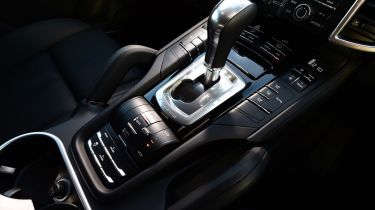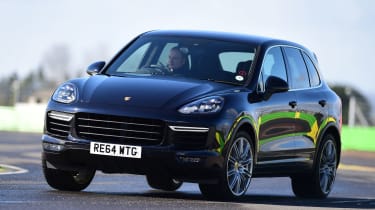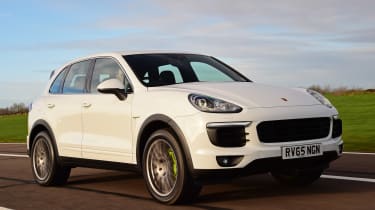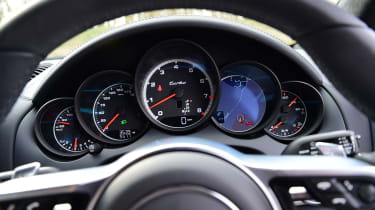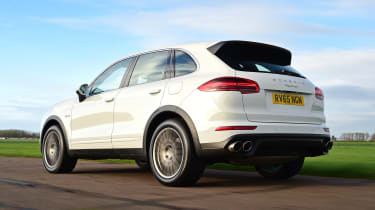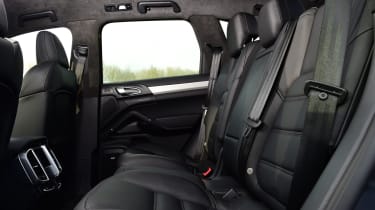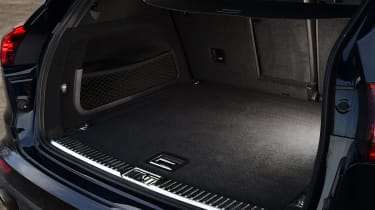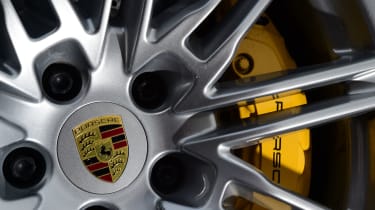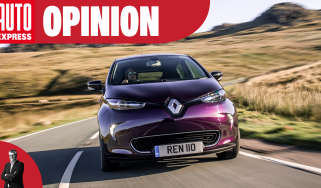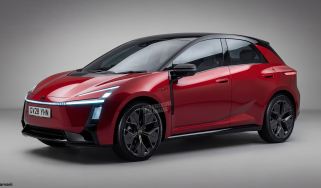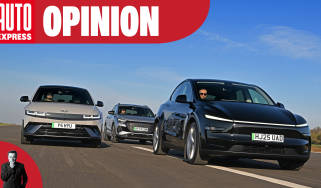Porsche Cayenne (2011-2017) review
If you want a large SUV with the performance and handling of a sports car, the Porsche Cayenne is it

Few cars can deliver the range of talents that the Porsche Cayenne offers. While Porsche purists sneer at the firm's SUVs, if it wasn't for the rampant success of the Cayenne, as well as the later Macan, then Porsche wouldn't have been able to develop its sports cars to the extent it has. And to dismiss the Cayenne as 'another SUV' is a disservice to the breadth of its abilities, which include the kind of handling that Porsche is famous for.
The first Cayenne arrived in 2002, while the current Mk2 model arrived in 2011. This version features a platform that's shared with the Volkswagen Touareg and first Audi Q7. The Cayenne is assembled in the same VW Group plant as those two in Bratislava, Slovakia, before being shipped to Porsche's factory in Leipzig, Germany, for the fitting of the interior.
While the basic platform is shared with other VW Group models, the Cayenne has its own bespoke settings to deliver a more entertaining drive, while the fitting of the interior by Porsche means it shares more with the Panamera and 911 from behind the wheel than it does the Touareg and Q7.
And it behaves more like a sports car than an SUV, too. All models are sharp to drive, with positive steering and decent power, but the faster GTS and Turbo models really are like oversized rally cars in the way they drive, with searing acceleration and huge amounts of four-wheel drive grip that means they handle like cars half their size.
Used - available now

2023 Porsche
Cayenne
55,000 milesAutomaticPetrol2.9L
Cash £38,999
2018 Porsche
Cayenne
65,500 milesAutomaticDiesel3.0L
Cash £21,750
2018 Porsche
Cayenne
112,124 milesAutomaticDiesel3.0L
Cash £13,333
2023 Porsche
Cayenne
34,242 milesAutomaticPetrol3.0L
Cash £52,975Each Cayenne model has its own engine, so the seven-model line-up has seven engines. The Cayenne Diesel kicks off the range with a 262bhp 3.0-litre V6, and has a price tag of just over £53,000. Next up is the Cayenne S, which is the first petrol model in the range. Up until 2014, this had a 395bhp 4.8-litre V8, but this was replaced by a more powerful yet efficient 420bhp twin-turbo 3.6-litre V6.
Next up is the plug-in Cayenne S E-Hybrid, which uses a 3.0-litre petrol V6 and electric motor to produce 416bhp, but emissions are 75g/km, making it an attractive choice for company car drivers. This model, as well as the entry level diesel, is also offered in limited Platinum Edition spec, a special model designed to shift more cars as the Mk2 is nearing the end of its production run.
The Cayenne S Diesel has a 385bhp 4.2-litre V8 and claimed economy of 35.3mpg, while the GTS has a 440bhp 3.6-litre twin-turbo V6, sharper handling and a look inspired by the Turbo model.
The top-spec Cayenne Turbo and Turbo S use the same 4.8-litre twin-turbo V8, with either 520bhp or 570bhp. Until the Bentley Bentayga arrived, the Turbo S was the fastest SUV in the world, with a top speed of 176mph and a 0-62mph time of 4.1 seconds. All models get permanent four-wheel drive and an eight-speed Tiptronic gearbox.
Rivals for the Cayenne are varied, because there is a wide range of versions available. The basic models rival SUVs such as the BMW X5, Range Rover Sport, Mercedes GLE-Class, Maserati Levante and Volkswagen Touareg, while the plug-in E-Hybrid has rivals in the shape of the Volvo XC90 T8 and Audi Q7 e-tron.
The faster Cayennes rival the Range Rover Sport SVR, Mercedes-AMG GLE 63, Audi SQ7 and fast estates like the Audi RS6 Avant and Mercedes-AMG C 63.
If you’re looking for a full-size SUV with family practicality, but hanker after the performance of a sports car, then the Porsche Cayenne could be just the car for you. The second generation car is better than its predecessor in every area – with improved performance, efficiency and less ostentatious styling.
The Cayenne’s amazing driving dynamics and sporty ambience don’t come without compromise though, as other luxury SUVs have a more spacious feel and offer even greater practicality.
Neither does the Cayenne come cheap, especially once you start ticking boxes on the expensive options list - and you will, as the standard spec is notoriously stingy across all models.
But if you’re fortunate enough to be able to afford it, the Cayenne’s charms rapidly consign such negative thoughts to the sidelines – as proven by the model’s global popularity.
Engines, performance and drive
The Cayenne Mk2 is based on the current Volkswagen Touareg, and like the smaller Macan – which also shares its platform with other models from within the VW Group – Porsche has thoroughly reworked the chassis. It’s focused its attention on the steering and suspension so the Cayenne lives up to the brand’s dynamics. This means it’s one of the sportier SUVs to drive on the market, while its replacement – which we’ll see for the first time in 2017 – will use the same chassis as the new Audi Q7 and Bentley Bentayga, so it should be even sharper.
From the driver’s seat the Porsche Cayenne feels more like a sports car than an SUV – the low driving position and high transmission tunnel are similar to that in the Panamera saloon. On the move the feeling continues, where even the diesel offers impressive straight-line performance, and there's lots of grip and composure through the bends.
The Cayenne’s agility is superior to the BMW X5 and Mercedes GLE, and it's notably easier to manoeuvre. Body control is good, especially on the optional air suspension. And yet, despite all this, the Porsche is almost as relaxing and refined as the Range Rover Sport.
The steering offers good weighting and precision. Its accuracy gives the sense the car is still a sporty 4x4. The chassis corners with minimal roll, and the optional air-suspension with adaptive dampers allows you to tune the ride for a firmer, sharper drive or a more soothing, comfortable set-up.
However, even with the dampers in Comfort mode the Porsche has a slightly nervous edge to the ride. Body control is brilliant for a 2,110kg machine, but it means on washboard roads you feel the surface. On motorways it’s comfortable, but it’s pointier when you want it to be (especially in Sport and Sport+), offering greater driving enjoyment compared to softer, more wallowy rivals.
If driving thrills are top of your priority list, the newly revamped GTS is our top pick. In early 2015, it ditched the thirsty V8 for a twin-turbo V6. It's even quicker than before, and is the most agile model in the Cayenne range. The GTS allows for some slippery driving if you switch on the PSM (Porsche Stability Management), but turn it off and you can pull rear-wheel-drive-style smoky drifts – which is frankly astonishing from a two-tonne SUV.
Should you choose to take your Cayenne off the road, you'll be astounded at how capable it is. The hill-descent control and locking differentials (a method of increasing traction by controlling wheel rotation speed) mean the Cayenne is adept at crossing very harsh terrain, although the wading depth is beaten by Land Rover's rivals.
You'll need the adaptive air suspension too, which can raise the ride height for tricky sections. Even the flagship Turbo likes to splash about off-piste, but for us the pick of the range remains the Cayenne S Diesel, which uses an incredible sounding 4.2-litre V8 that is just as fast in-gear as the Turbo but is much more economical than its petrol counterpart.
Engines
The Cayenne engine line-up kicks off with the 3.6-litre VR6 petrol-powered standard model that delivers 0-62mph in 7.7 seconds. The 3.0-litre diesel V6 is quicker at 7.3 seconds, but its 137mph top speed is a few mph slower than the petrol, which can do 143mph. After that, the options just get faster…
No Cayenne could be considered slow, but choose the V8 Turbo or Turbo S and you’ll accelerate quicker than most of the firm’s own sports cars – 0-62mph arrives in 4.5 seconds or 4.1 seconds, and top speeds are 173mph and 176mph respectively.
The plug-in hybrid model can travel 22 miles on battery power alone if you’re not in a hurry, and if you are it will crack the 0-62mph dash in 5.9 seconds. Not bad for an eco-friendly model.
Purists might once have sneered at the idea of a diesel Porsche, but any concerns about the engine are dispelled as soon as you turn the key of the Cayenne S Diesel. The combination of 382bhp, a mighty 850Nm of torque and a sporty throttle response means the Porsche rides a never-ending wave of thrust.
All models come with a Tiptronic automatic gearbox that is smooth and responsive in automatic mode, and mostly on-pace when you're using the paddle-shifters too.
MPG, CO2 and Running Costs
Economy and efficiency varies greatly depending on what model you choose, and top of the tree for non-hybrid Cayennes is the V6 diesel, which can return a very reasonable 42.8mpg. At the other end of the scale is the V8 Turbo S, which manages 24.6mpg but chucks out 267g/km of CO2 – some 100g/km more than the Porsche Cayenne Diesel.
Costing exactly the same to buy as a Cayenne S Diesel, the new S E-Hybrid is by far the most economical. It can run for up to 22 miles on electric alone before the V6 petrol engine kicks in to work alongside the electric motor and top up the cells. It achieves combined fuel economy of 83.1mpg, and emits 79g/km of CO2, although it is possible to never use the petrol engine at all if you restrict the car to a short commute.
Compared to the BMW X5 and especially the VW Touareg, the Porsche Cayenne is more expensive but feels more special than any of its rivals. Like the rest of the Porsche range there are many options and personalisation choices, but these are usually expensive and can quickly send the cost of the Cayenne spiralling out of control.
Beware the options list too. The Cayenne Diesel is the entry-level model at just over £53,000, but you have lots of scope to tailor your Cayenne, with Sport, Touring and Innovation packages, plus Porsche’s Exclusive customisation scheme, which will all send prices spiralling higher.
Cayenne spec levels are very stingy, with none of the models offering sat-nav, Bluetooth or DAB radio as standard. This unacceptable lack of equipment is even more annoying when you consider all of those items are standard fare in the BMW X5 and Range Rover Sport. Speccing up your Cayenne to match these talented cars can get very expensive.
Insurance groups
If you have to ask what insurance group a Cayenne Turbo falls into, you probably can’t afford the premiums – but since you did, it’s group 50. Even the ‘starter models’ in the Cayenne line-up are group 40, with the mid-rangers splitting the difference in group 45.
Depreciation
Sell your car after three years and the Cayenne can offer strong used values of 57.2 per cent of the original price, but with prices that can comfortably top £100,000 even a relatively small percentage drop can be eye-watering.
Interior, design and technology
When Porsche first launched its Cayenne, looks were a major talking point. However, the styling has evolved and it’s become much more attractive. This facelifted version of the Mk2 car is arguably the prettiest model ever produced.
Unfortunately, the looks are actually rather restrained when compared to rivals such as the BMW X6 and Range Rover Sport. The boxy proportions are pure SUV, and the car shares its overall shape with the VW Touareg, which is built on the same platform.
Integrating the looks of a 911 with an SUV was always going to be a hard task, and while the round light clusters, smooth nose and curving bonnet are all present, it doesn’t really grab your attention when compared to the bold and imposing front ends of the BMW and Range Rover. Still, some people will appreciate the Cayenne’s subtlety, and see this as more of an attraction than a negative.
And if you need to stand out, you can always raid Porsche’s extensive list of alloy wheel options, exclusive paint schemes, and even a chunky bodykit. Besides, the looks will soon be forgotten once you climb on board.
Inside, the Cayenne instantly feels more like a sports car. Porsche’s familiar, five-dial set-up sits right in front of you, while the lower driving position and high centre console give the impression of a performance coupé. This is reinforced by a steering wheel design that’s been carried over from the brand’s 918 hypercar.
The Cayenne’s build quality feels solid and the finish is excellent, with lots of leather and metal detailing adding some sparkle. However, one gripe we have with the Cayenne is the options list. While you get a fair amount of kit, you still have to pay extra for items such as a parking camera and keyless go, even on models such as the £93,574 Turbo model.
Sat-nav, stereo and infotainment
The Cayenne now gets Porsche’s latest Communication Management 4 set-up, mirroring the smaller Macan. This brings smartphone-style pinch and swipe gestures – useful for sat-nav maps and is simple to operate. The seven-inch colour touchscreen is vivid and the menus are logical, while the hot keys for the main functions offer handy shortcuts.
Apple CarPlay is standard to boost connectivity, while other apps include Porsche Car Connect. This lets you send destinations from your mobile device, plus you can check the car’s status – such as remaining fuel level and range – on any Apple device, including an Apple Watch.
You can use your mobile to stream music in the Cayenne, and there’s digital TV capability and the possibility to create an in-car wireless hotspot using Porsche’s optional Connect Plus system, which costs around £690.
Serious audiophiles may also want to splash out around £3,230 on the Burmester High-End Surround System, which boasts 16 speakers and 1,000 Watts of output.
Practicality, comfort and boot space
Despite the Cayenne’s raised ride height, a low seating position gives it a sporty feel, which is enhanced by the sculpted steering wheel and metal shift paddles, plus a console that wraps around the driver. The front seats are very supportive during hard cornering, as well as offering excellent long-distance comfort.
It’s not that roomy in the cabin though, with the high transmission tunnel making it a much more intimate space than rivals, which tend to have a more airy feel. While the major controls are laid out perfectly, it’s fair to say the ancillary controls are not all so well-positioned, as there is a confusing array of switches either side of the gear lever.
There are, however, two handy drawers underneath the front seats and a large refrigerated glovebox.
Size
Although its second-generation redesign cleverly made the Cayenne appear a little more compact and lithe, it’s still a big car. At 4,855mm overall it’s almost the same length as the BMW X5 and Range Rover Sport. The Range Rover is nearly 15cms wider than both the Germans, but the Porsche is noticeably lower than the other two. Its roof height of 1,705mm undercuts the 1,776mm BMW and 1,780mm Range Rover by some margin.
Leg room, head room & passenger space
The Cayenne’s rear seats slide back and forth altering the amount of room available for rear passengers and luggage, but overall the space inside is generous for five people. There’s plenty of leg- and headroom in the back, and the rear seats recline too. There’s no optional third row, but Isofix child seat mounts do come as standard.
Boot
At the back, the squared-off rear means there’s a huge 670 litres of space on offer, which expands to 1,780 litres with the split-folding rear seats stowed. A powered tailgate is standard to aid access, but while the boot is bigger than the BMW X5’s, it’s actually smaller than both the Mercedes M-Class and the Range Rover Sport. Add the optional air-suspension, and it can be lowered from the boot to aid access.
Aside from the space itself, there aren’t many useful touches, although the luggage area is as well-trimmed as you’d expect from a Porsche. If you intend to use the luggage space to its full extent, you may want to pay £260 for a load space management system, which adds floor rails, eyelets and a set of retaining straps.
The Cayenne is also a pretty good tow car with all models capable of hauling a 3,500k braked trailer. Just the thing for taking your GT3 to track days…
Reliability and Safety
Porsche’s motorsport heritage, including its numerous Le Mans 24 Hours wins, demonstrates that the brand knows how to build a car that lasts, and this experience has filtered through to its production models.
While the Cayenne is painted and assembled alongside the Touareg at VW’s plant in Slovakia, the interior is hand-finished by Porsche employees in Germany before engineers meticulously inspect each model to ensure the highest standards are met.
Porsche is a perennial strong performer in our annual Driver Power survey, and in 2016 it finished a respectable seventh, having ranked sixth the two previous years. In the reliability category, Porsche owners rated the company 17th out of 35 manufacturers, but for build quality the brand was up in an excellent fourth – behind only Lexus, Jaguar and Audi.
The Cayenne itself was facelifted last year, but as it’s based on Porsche’s proven tech, it should continue to prove reliable.
The model should be safe too. Although it hasn’t been tested independently by the EuroNCAP crash testers, they did appraise the first generation Volkswagen Touareg and awarded it a five-star rating back in 2004. Both the Touareg and Cayenne have moved on a generation since that test, but the basics have remained much the same.
Buyers often pick large SUVs for the reassuring feeling of safety brought by the high driving position and sheer scale. In the Porsche’s case such feelings are further heightened by the agile handling, safe overtaking reserves and high-quality build – although some of the more advanced brake-assist and city-braking functions offered by luxury SUV rivals are notable by their absence from the options list.
Warranty
Porsche isn’t generous with the Cayenne’s warranty, offering only two years of factory cover. At least they offer unlimited mileage for the period.
Extended warranties are available of course, but they’re pricey – you can expect to pay around £1,000 for additional years.
Servicing
The Cayenne’s servicing costs are fair, as the car has two-year intervals. It means the first three checks for the Cayenne Diesel will cost £1,505, but this covers up to six years, higher performance models will cost more.
